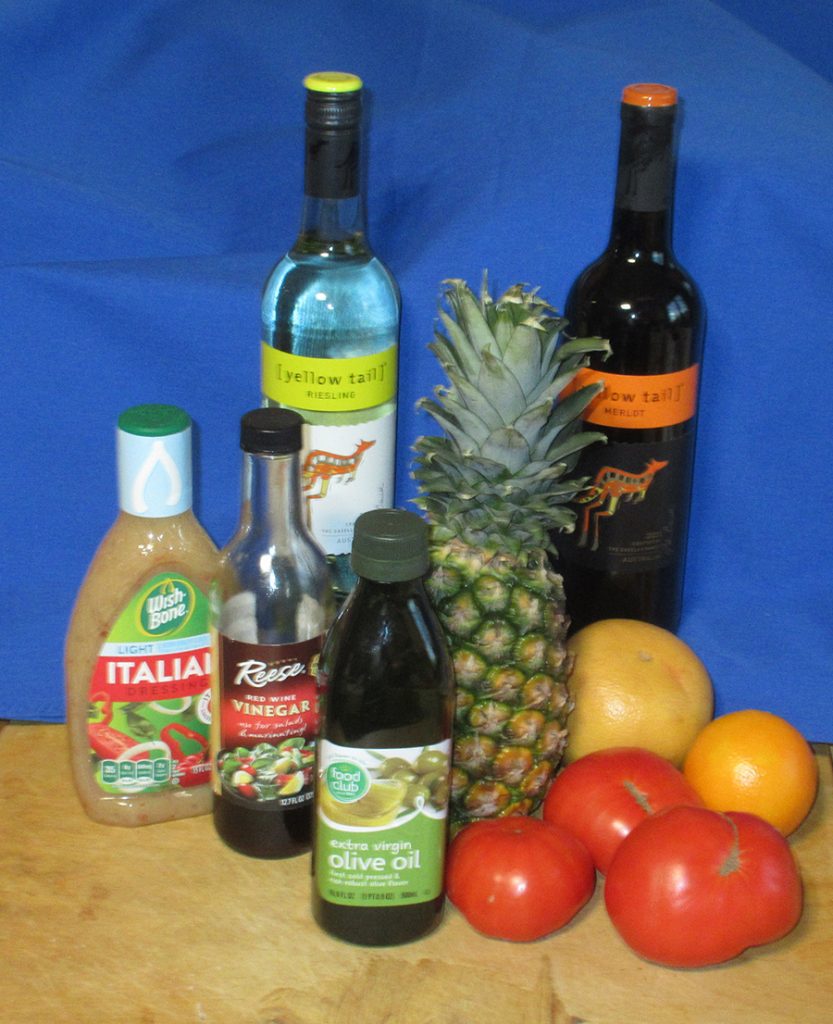Marinating any meat will improve its flavor, taste and appeal. With wild game, marinating may also remove or mask any real or perceived gamey taste or aroma the meat may have. If you haven’t prepared meat this way, you should. Marinating simply breaks down meat fibers and gives added flavor.
You have several marinating options:
- Any acid-based liquid will work as a marinade, such as a weak vinegar-water solution (1 cup vinegar to 1 gallon water).
- Other acid-based items include: • milk • citric juices (orange, lemon, lime, grapefruit, clementines, tangerines) • Italian salad dressing • tomato juice. Tomato juice will neutralize strong odors. The naturally high acidic content of tomato juice also helps tenderize meat.
- Many berries contain naturally occurring citric acid. Berries with higher amounts of citric acid include strawberries, raspberries, cranberries, red and black currants, and gooseberries. Blueberries do not contain acids.
- Pineapple contains citric acid.
- Stone fruits, such as cherries, peaches and apricots, also contain citric acid.
Wine Is Fine
Wine works well in many wild game recipes (and in many wild game cooks). Wine can be a meat tenderizer in a meat marinade, or it can be a seasoning. Wine is as easy to use as salt and pepper, and it brings food flavors together in interesting ways. The alcohol evaporates as the wine cooks, leaving only the fine flavor, so it can be used in any family recipe.
To use wine in recipes that don’t call for it, just substitute it for part of the other liquids called for.
Use a good table wine in your cooking instead of a cooking wine. You will like the results better. Red meats can be cooked with red wines; they generally have richer or more robust flavors. Fish often is best with white wine. But try things and find out what you prefer.
Five Important Marinating Notes:
1) No matter which marinade you use, cover the meat and refrigerate it for the entire marinating process.
2) Foods can be marinated up to 48 hours, but 24 hours usually is long enough for the marinade to penetrate the meat, thus adding flavor.
3) Marinate meat at least 4 hours; 8 hours is better. When using commercial marinades, follow instructions on the package.
4) Do not cut chops or steaks until ready to marinate or cook. Any cut creates water loss from the meat; thus, the earlier the cuts, the more the meat will have dried before you’re ready to work with it.
5) WARNING: If a marinade is used and drained off, then reused to baste the meat during cooking, the marinade must be heated to the boiling point 1-2 minutes before it is reused. Bacteria from the meat could be in the marinade and make it unsafe if it isn’t reheated.
Here are several excellent marinades:
RED WINE MARINADE
Mix 1 cup dry red wine, 2 cloves garlic, 2 tbsp. white vinegar, 1 cup cooking oil, 1 small onion (minced), and 1 tsp. salt. Marinate a three-pound round steak overnight in a non-metal container, being sure the meat is covered, or turning it a couple of times. Grill the meat, brushing with marinade.
Judy Helgeland, Mequon, WI
MEAT MARINADE
- ½ tsp. garlic powder per pound of meat
- Red wine
- Rub garlic powder into meat. Place meat in a container and cover meat with red wine. If desired (with tough meat), use meat tenderizer as directed in the marinade. Cover and refrigerate for eight or more hours, or overnight.
- When grilling the meat after marinating, use the marinade liquid to baste the meat.
- You can also use this marinade when roasting meat in a Dutch oven. It does wonders to and for meat.
MaurIe Voland, Raleigh, NC
MARINADE
- 9 tbsp. whiskey or red or white wine 1/2 tsp. salt
- 2 tsp. soy sauce 1/2 tsp. oregano
- 2 tbsp. vinegar 1/2 tsp. basil
- 3 cloves garlic, sliced 1/2 tsp. MSG
- 2 tbsp. cooking oil 1 tsp. fresh ground pepper
Combine all ingredients and mix well. Place meat (about 2-3 lbs.) in marinade and place in refrigerator for 12 hours. Remove meat from marinade and cook over direct heat (coals, broiler) or place meat in a Dutch oven with 1 cup water and roast covered at 250-degrees F. for 3-4 hours. Serves 4-6.
Lorraine Vogt, Burnsville, MN
GAME MARINADE
- 3/4 C. port wine 1 small onion, thinly sliced
- 1-1/4 C. olive or cooking oil 6 peppercorns
- 3 sprigs tarragon (1/1 tsp. ground) 1/8 tsp. sage
- 2 stalks parsley (1 tsp. dried) 1 tsp. slivered lemon peel
- 1 large celery stalk, chopped
Combine all ingredients in a small container with lid. Cover and shake to mix well. Marinate game according to recipe directions.
Pat Peterson, Mequon, WI
————————————
To order THE WILD PANTRY wild game cookbook, go to www.targetcommbooks.com for details. The price is only $12.95 plus shipping/handling. It is publication #15 in the On Target” series of outdoor books from Target Communications.
Chapters include: Appetizers, Chops/Roasts/Steaks, BBQ/Crock Pots/Stews, Stir-Fry/Stroganoff/Kebabs, Ground Meat & Chili, Casseroles, Mexican & Italian, Sausages, Jerky, Pickling & Canning, Small Game & Birds, Fish & Seafood, Complementary Foods, Marinades & Salsas.
THE WILD PANTRY has more than 200 recipes, mostly for venison. It is comb-bound to lay flat on your kitchen counter. It also includes a chapter on Dutch Oven cooking and a chapter on Dutch Oven recipes. There’s also an in-depth chapter titled “How a Proper Diet Helps You Hunt Better”.
The book also has several entertaining short stories about successful and unsuccessful wild game meals and items related to meals — Daylight in the Swamp, Grandpa’s Stew & Bryant’s Dumplings, “I Like Mine Turned Over”, “Just the Way I Like It”, Rusty the Asparagus Hound, Deer Camp Manhattan, Not Even the Woodpeckers and Not Even the Cows (a pre-bear-hunt feast that includes three recipes, including a bear roast).

